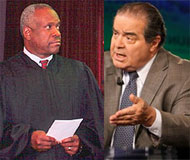4/23/2014
US Supreme Court Backs Anonymous Tip Traffic StopsUncorroborated anonymous tips can justify traffic stops under a new US Supreme Court ruling.

A quick call to 911 can lead to any car on the freeway being pulled over and searched. Thanks to a ruling handed down Tuesday by the US Supreme Court, police officers no longer need to corroborate an anonymous claim that someone is reckless or drunk behind the wheel before hitting the emergency lights and conducting a traffic stop.
This is what happened on August 23, 2008, when an anonymous tipster claimed a silver Ford F150 pickup had run her off the road on Highway 1 in Mendocino County. That was enough for California Highway Patrol Officer Thaddeus Williams to pull over the pickup truck driver, Lorenzo Prado Navarette, who was later charged with marijuana possession.
The only thing known about the 911 caller in the case was that the voice sounded like a woman's. Dispatchers had no way to verify that the person was even calling from the area. The question before the high court was whether tips of this nature are reliable enough for law enforcement agents to take action, or do they need first to see some evidence of wrong-doing on their own.
Writing for the majority, Justice Clarence Thomas found the tip reliable because the caller proved to be correct about the truck's license plate and its approximate location when police caught up to it about 18 minutes after the call. The claim of recklessness proved sufficient to establish the likelihood that the driver was drunk (though in this case, Navarette was sober).
"Unconfirmed reports of driving without a seatbelt or slightly over the speed limit, for example, are so tenuously connected to drunk driving that a stop on those grounds alone would be constitutionally suspect," Justice Thomas wrote. "But a reliable tip alleging the dangerous behaviors discussed above generally would justify a traffic stop on suspicion of drunk driving."
Although the arresting officer in this case saw no indication of impaired driving after following the truck for five minutes, the majority found that this did not dispel the suspicion that the driver was intoxicated.
"It is hardly surprising that the appearance of a marked police car would inspire more careful driving for a time," Justice Thomas wrote. "Of course, an officer who already has such a reasonable suspicion need not surveil a vehicle at length in order to personally observe suspicious driving."
In an unusual split, Justice Antonin Scalia joined the court's liberal wing -- Justices Ruth Bader Ginsburg, Sonia Sotomayor and Elena Kagan -- in warning of the ruling's negative consequences.
"So long as the caller identifies where the car is, anonymous claims of a single instance of possibly careless or reckless driving, called in to 911, will support a traffic stop," Justice Scalia wrote. "This is not my concept, and I am sure would not be the Framers', of a people secure from unreasonable searches and seizures."
The dissenters pointed out that the tipster was annoyed at being run off the road, but that does not necessarily mean that the truck driver was drunk.
"Who really knows what (if anything) happened?" Justice Scalia asked. "The truck might have swerved to avoid an animal, a pothole, or a jaywalking pedestrian… Or, indeed, he might have intentionally forced the tipster off the road because of some personal animus, or hostility to her 'Make Love, Not War' bumper sticker."
The police officer could not have stopped the truck for the discrete act of running the woman off the road because he did not witness what happened. He could only have conducted a stop based on an ongoing violation, such as drunk driving. After following the truck for five minutes, the officers saw no signs of recklessness or drunkenness.
"After today's opinion all of us on the road, and not just drug dealers, are at risk of having our freedom of movement curtailed on suspicion of drunkenness, based upon a phone tip, true or false, of a single instance of careless driving."
A copy of the decision is available in a 150k PDF file at the source link below.


